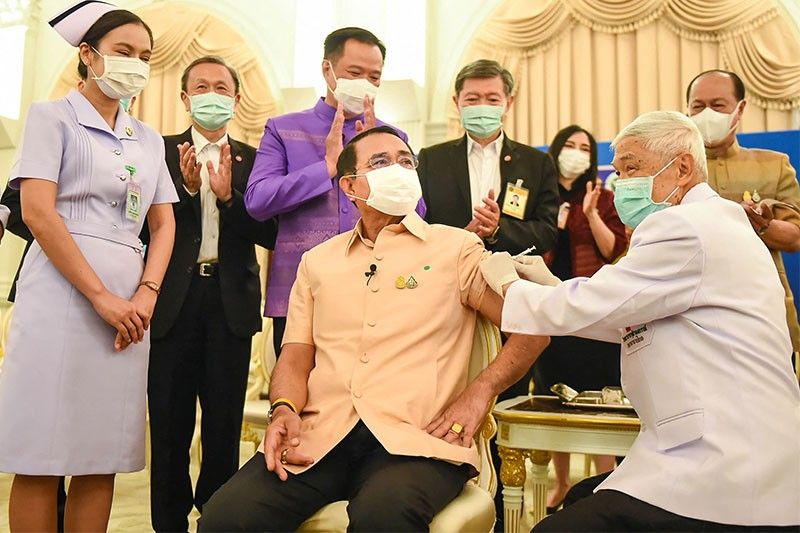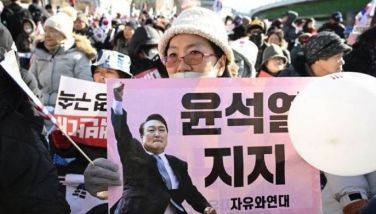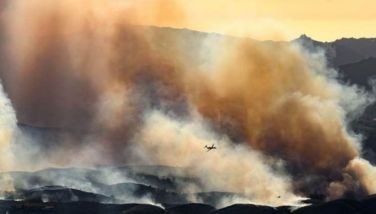Thai PM gets AstraZeneca jab as country resumes rollout despite concerns

BANGKOK, Thailand — Thailand's prime minister on Tuesday received the AstraZeneca vaccine as the Southeast Asian nation began the drug's rollout, lifting a suspension that was triggered by European nations raising safety concerns.
The country became the first outside of Europe to temporarily delay the Covid-19 vaccine after several EU nations — including Ireland, the Netherlands and Denmark — moved to delay it due to reports that some recipients had suffered blood clots.
Thailand is already administering China's Sinovac vaccine, with millions more imported doses expected in the coming months.
But it was expected to add the Oxford/AstraZeneca injection to its vaccine options on Friday, before health authorities abruptly suspended it as a precaution.
By Monday, it had cleared its use after the World Health Organization, the European Medicines Agency and many countries, including Britain and Canada, declared it safe for use.
"Today, we will start injections on another vaccine. I think it will create confidence for people to get the vaccine," Thai premier Prayut Chan-O-Cha said.
The gruff former general's jab was initially scheduled for Friday but it was postponed at the last minute following the delay. The country's political leaders went ahead with their jabs on Tuesday.
"Everyone is fine. I am an example today for having AstraZeneca," the 66-year-old, who was the first person to receive the jab in the Southeast Asian country, said of his cabinet.
WHO safety experts were preparing to meet Tuesday over the vaccine melee as the three largest EU nations — Germany, Italy and France — followed other EU members in suspending the shot on Monday, dealing a blow to the global immunisation campaign.
The vaccine was developed by AstraZeneca and the University of Oxford in Britain, where more than 11 million doses have been administered apparently without any major problems.
Thailand is not set to start its own mass vaccination campaign until June, with more than 60 million shots planned through domestic production of the AstraZeneca vaccine.
But it is vaccinating essential workers and other groups with more than 100,000 AstraZeneca jabs imported for emergency use earlier this month.
AstraZeneca's shot, among the cheapest available, was billed as the vaccine of choice for poorer nations and the clot reports have had an impact beyond Europe.
Indonesia delayed its AstraZeneca rollout on Monday, and Venezuela announced it would not authorise the jab over fears of "complications".
Pharma giants Sanofi and GSK said on July 29, 2020, that they have agreed to supply Britain with up to 60 million doses of a potential COVID-19 vaccine. The agreement covers a vaccine candidate developed by France's Sanofi in partnership with the UK's GSK and is subject to a "final contract."
This thread collects some of the major developments in the search for a vaccine to ease the new coronavirus pandemic. (Main photo by AFP/Joel Saget)
As negotiations towards a new pandemic treaty pick up pace, observers warn of watered-down efforts to ensure equitable access to the medical products needed to battle future Covid-like threats.
Shaken by the pandemic, the World Health Organization's 194 member states are negotiating an international accord aimed at ensuring countries are better equipped to deal with the next catastrophe, or even prevent it altogether.
The process is still in the early stages, with the aim of reaching an agreement by May 2024.
But critics warn that revisions being made to the preliminary negotiating text are weakening the language -- notably in a key area aimed at preventing the rampant inequity seen in access to vaccines and other medical products during the Covid pandemic.
"I think it is a real step backwards," Suerie Moon, co-director of the Global Health Centre at the Geneva Graduate Institute, told AFP. — AFP
Africa's first mRNA vaccine hub is ceremonially launched on Thursday to acclaim from the UN's global health chief, who hailed it as a historic shift to help poor countries gain access to life-saving jabs.
The facility was set up in the South African city of Cape Town in 2021 on the back of the success of revolutionary anti-Covid vaccines introduced by Pfizer/BioNTech and Moderna.
"This precious project... will bring a paradigm shift in addressing the serious problem we faced, the equity problem, during the pandemic, so (that) it's not repeated again," World Health Organization (WHO) head Tedros Adhanom Ghebreyesus tells a media briefing to mark the inauguration. — AFP
China has approved its first locally developed messenger RNA (mRNA) vaccine against Covid-19, its manufacturer said Wednesday, months after the relaxation of strict Covid-zero regulations sparked a surge in cases.
The vaccine, developed by CSPC Pharmaceutical Group Ltd, has been approved for "emergency use" by Beijing's health regulator, the company said in a statement.
It showed high efficacy in a trial in which it was used as a booster shot for people who have been given other types of vaccines, the company added, without offering further details. — AFP
COVID-19 vaccine maker Novavax raises doubts about its ability to continue its business, announcing plans to cut spending after struggles in rolling out its coronavirus jab.
Shares of Novavax plummeted 25 percent in extended trading, after the company reported fourth-quarter earnings that missed analyst estimates.
While the firm should have enough money to fund operations, the situation is "subject to significant uncertainty," it says in a statement. — AFP
The protection against Covid-19 from being previously infected lasts at least as long as that offered by vaccination, one of the largest studies conducted on the subject says.
Ten months after getting Covid, people still had an 88% lower risk of reinfection, hospitalisation and death, according to the study published in the Lancet journal.
That makes this natural immunity "at least as durable, if not more so" than two doses of Pfizer or Moderna's vaccines, the study says.
The authors nevertheless emphasized that their findings should not discourage vaccination, which remains the safest way to get immunity. — AFP
- Latest
- Trending



































